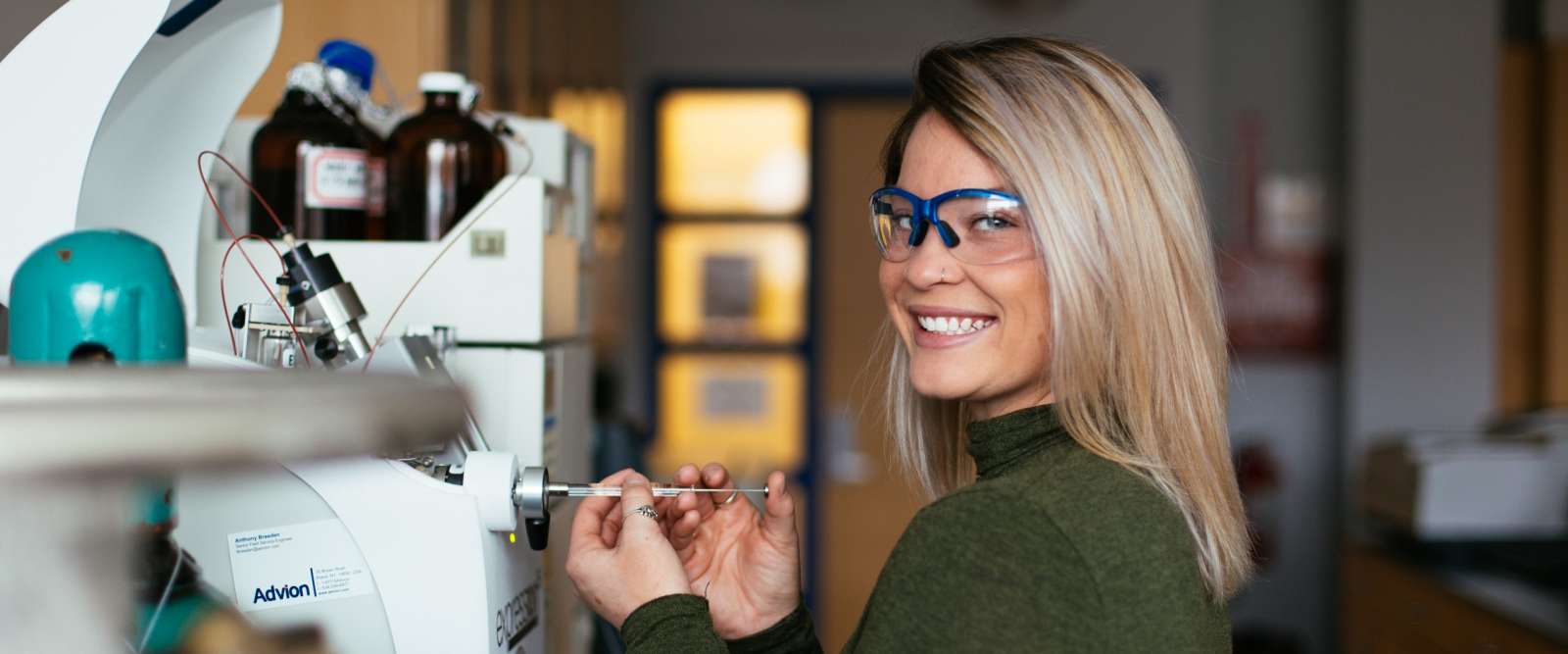Overview
Chemistry occupies the second floor of the Putnam Science Center in an ample space containing specialized teaching laboratories, dedicated research areas, and custom built rooms for state-of-the-art equipment. Our chemistry students become regulars in these spaces, learning how to collect, analyze, and interpret data with the available major instrumentation and specialized chemical apparatus. The department owns an atomic absorption instrument, infrared spectrophotometers, UV/Vis spectrophotometers, a gas chromatography system, a capillary electrophoresis instrument, a Fourier Transform NMR spectrometer, a single crystal X-ray diffractometer, a glovebox for working with air sensitive samples, and a high-pressure liquid chromatography unit that is coupled to a electrospray mass spectrometer. Students engaged in research projects also have access to a computer-controlled instrument to do microwave synthesis, a lyophilizer, a solvent delivery system, a modular conductivity detector, electrochemical probes, and other small equipment used in projects. Importantly, our students learn how to use this equipment by getting hands-on training and experience through their courses and undergraduate research.
Faculty at KSC are committed to mentoring our majors a minimum of 400 hours in the laboratory beyond the introductory General Chemistry course. This time spent one-on-one with our distinguished faculty broadens our students’ experiences, their understanding of the discipline, and of how chemistry plays a critical role in our world. The faculty at KSC are not just teachers, but also scholars in pursuit of solutions to a variety of problems. Students are encouraged to join faculty in pursuit of a research project and further develop their own skills in the classroom and laboratory. As a result, students quickly pair up with faculty members to work on research projects in areas such as analytical, organic, inorganic, organometallic, physical, and biochemistry. Several chemistry faculty have collaborations with other departments at Keene State and partners in the private sector.
The department and college offer opportunities for chemistry majors to further build skills and interests in the field of chemistry. Students have presented their research results at the annual Academic Excellence Conference, meetings of the American Chemical Society, the NH-INBRE (Idea Network of Biomedical Research Excellence) Annual Conference, as well as other national and even international conferences. KSC has placed students in summer REU (Research Experience for Undergraduates) programs, which is sponsored by the National Science Foundation, in departments across the country. A growing percentage of our students graduate with scholarly publications in their resumes, reflecting the ability to engage in unique and important research projects while pursuing an undergraduate degree.
If you’re considering any of the chemistry majors, consult a faculty member early for advice on the sequence of courses, as courses in related fields are prerequisites for upper-level chemistry courses. You should have strong math skills and curiosity about the natural world and how chemistry plays a role in it, be engaged in learning the fundamentals of chemistry, and be excited to apply new technical skills in a laboratory setting through hands-on activities.
As a Keene State Chemistry students you experience hands-on training with all of the college’s facilities and equipment through your coursework as well as original research projects with the faculty. You gain real-world practical training by engaging in independent study and research projects, participation in summer research at KSC or at other institutions, and through internships, coops, or employment in local industry.
Program Options
Chemistry students at Keene State may complete either a comprehensive BS degree or a BA degree designed to combine with a major or minor in another subject, like biology or education.
Chemistry BS
The Chemistry BS is accredited by the Committee on Professional Training of the American Chemical Society (ACS). Completion of this program leads to a BS in Chemistry with American Chemical Society Certification. The major is generally oriented toward preparing students to become professional scientists. The curriculum is rigorous, but it’s flexible enough to prepare students for immediate employment, graduate study, or work in an allied profession.
Chemistry BA
The BA in Chemistry is designed for students interested in careers in areas that use chemistry as a base, such as the health-related professions, STEM pharmaceutical marketing, secondary science education, chemistry-related industry, or entrance to graduate school. The BA offers the flexibility of combining the chemistry major with another major or minor from a different discipline.
Steps Program
Chemistry majors are eligible to be part of the STEPS Program that supports students with scholarships, research opportunities, and academic and professional development.
Request Information
Career Opportunities
Many Keene State graduates go directly to graduate programs in chemistry, enter medical, dental, or pharmacy schools, or enter health-related, industrial, environmental, or teaching careers. Chemistry students at KSC have gone on to graduate programs at Cornell, Dartmouth College, Purdue University, Clark University, University of Colorado, Boston University, Brandeis University, and many other institutions. Some have gone on to medical school. Many others obtain teaching certification and find careers teaching middle or high school science – a critical need in education. Still others are working in industry, including at Markem-Imaje, Pfizer, Strem Chemicals, and other companies.
I cannot stress enough how well prepared I was entering the work field directly out of school, thanks to Keene and all of the faculty.
Somer Matar ‘15, Research Scientist at Wren Laboratories
Outcomes
Graduates from Keene State’s chemistry programs learn to:
- Apply critical thinking skills and a broad range of knowledge in the fields of chemistry to the solution of theoretical and practical problems
- Demonstrate laboratory skills appropriate to the study of chemistry in a safe manner such as molecular synthesis and characterization utilizing modern instrumentation.
- Effectively communicate the results, analysis, and significance of a chemical investigation using written and oral formats.
- Understand the importance of chemistry as it applies to industrial, economic, environmental, and social issues.



